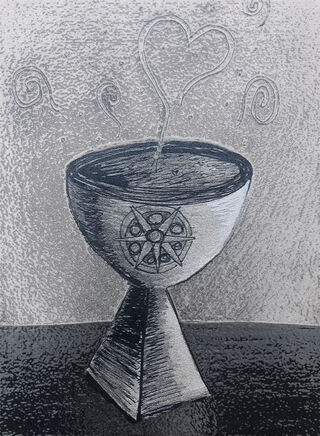Relationships
Understanding the Alchemy of Love for Better Relationships
You can transform unhealthy love with mindfulness.
Posted May 19, 2021 Reviewed by Ekua Hagan
Key points
- At best, what we commonly call love is often unhealthy. At worst, it's derived from our base needs and conditioning.
- Transforming unhealthy love takes work because it requires understanding one's own mind and putting someone else first.
- The path to healthy love often begins with taking a mindful approach to one's partner.

For those unfamiliar with alchemy, it is turning base metal into gold. In common vernacular, it is used to refer to turning something worthless into something priceless. Though that may be a bold statement for a psychology post about love, that is my theory.
The pathology of love
I often make the bold and perhaps exaggerated statement that love (as we view it in this culture) is pathology. In this sense, I am defining love as a disease state. However, in discussing it in the sense of alchemy, I am suggesting although it starts as something common from base origins, it can be made invaluable.
Recently, I was asked by another site to write a short essay about the difference between healthy and unhealthy love for inclusion in a post with other experts. I made it clear I believe all romantic love begins in the unconscious. One’s individual unconscious is influenced by many things, but the base is evolutionary drives (in this case, to couple and assure your genes continue). Added to this base drive is conditioning (beginning with the parental relationship and what feels comfortable). Then all other relationships (other familial relations, friendships, society, and culture, and finally early romantic encounters) add to and shape one’s concept of love and relationships.
I often use two quotes to emphasize the pathology of love. The most potent is by David R. Hawkins: “What the world generally refers to as love is an intense emotionality combining physical attraction, possessiveness, control, addiction, eroticism, and novelty.” (pg. 71). The other is by Psychology Today’s own Stanton Peele: “We often say ‘love’ when we really mean, and are acting out, an addiction — a sterile, ingrown dependency relationship, with another person serving as the object of our need for security.” Dr. Peele isn’t the only one who sees our common experience of love as an addiction. Anthropologist Helen Fischer also calls love an addiction in her TED Talk (2008).
So, my argument is that when one is falling in love with a partner, they attribute it to many things, but it begins with drives and attractions they might find base at best, and repulsive at worst. This type of love resembles addiction. Like an addiction, it isn’t healthy. Yet often love is attributed to mystical and magical attributes. This is why I make the argument what we call love in a romantic sense is pathology.
Of course, love in this sense isn’t completely worthless. Even this love, founded in base desires, conditioning, and cultural influences, has its merits. Added into this mix of confounding factors is a desire to grow, which attracts us to someone who is both comfortable but also has qualities that complement ours (think introvert to extrovert). Additionally, these drives and the lies the mind tells us to make them palatable, allow us to couple, procreate, and in some cases, provide life with meaning. Still, I think the analogy of alchemy is apt.
The path to healthy love
To turn this common love into invaluable (healthy) love is a difficult task, and a task most prefer to believe shouldn’t need to happen if “love” is real. I am consistently confronted with people who feel love should be easy and come naturally. And, if you are referring to the love described above, it is natural and easy. However, it does not last.
Natural romantic love is temporary for most. It lasts long enough to get us to couple and, in the case of many mammals, to get the offspring to survive on their own. It lasts as long as the projections (internal ideas cast onto the outside world, in this case, the desired other) last. As one’s desired partner becomes more human and real (rather than the god or goddess they were projected to be), as their differences become annoying rather than an inspiration for growth (think introvert to extrovert) the “love” fades. Though many report being willing to do the work when children and other investment makes separating difficult, few do. Most, if they stay together, live parallel lives and settle for coexistence.
Healthy love requires effort on multiple fronts. It requires understanding how your base and conditioned instincts have influenced your choices in a partner. It requires what Thich Nhat Hanh has proclaimed as love’s other name: understanding (Popova, M.). It requires putting the other first, not because of one’s own pathology of dependency, but out of the motivation to further the other’s growth and expansion, and to promote their long-term happiness. Healthy love renounces possessiveness, jealousy, and other outcomes of a fear of loss, and instead strives to be unconditional.
The path to this type of love starts by being more present. I recently read how Aldous Huxley focused on how we are caught in concepts of life, rather than really experiencing life. He proposed that to truly experience life we must suspend these concepts (Popova, M.). Zen Buddhism uses the word “shoshin” which translates to “beginner's mind." This refers to having no preconceived ideas about what we are approaching. This is difficult when we approach the same person daily or nearly daily.
Part of the issue that keeps love at a base level is the concept we hold of another. After years of being with someone, we assume to know them, and perhaps even believe we know them better than themselves. This is part of the brain’s function: prediction. People assume to know another’s motives. Of course, this can be correct some of the time. But often in relationships, this becomes a way of seeing the other negatively, with previous failures to meet one’s ideals piled under current failures. This leads to one of what Gottman calls the four horsemen dooming a relationship: contempt. Instead of loving the other, people begin to feel contempt for the person they once couldn’t stop thinking positively about.
As I alluded to earlier, giving up concepts and being more present, viewing another with compassion rather than contempt, and being loving are not easy tasks. Understanding without judgment is not easy. It goes against the default mode of the brain to pass judgment (see "Disagree, But Understand Why" for more). Getting past the brain’s natural and conditioned tendencies — in short, to overcome one’s concepts — takes a mindful approach. At the same time, no one is mindful all of the time (and it is rare to be mindful most of the time). So the goal is to improve these aspects, to catch oneself and step back, and to move toward healthy love more than not, or at least more than one currently is.
The avenue to this is to first be mindful. When encountering your loved one, perhaps take a breath and put yourself in a loving mindset. An old friend used to say you have to choose to love your partner every day. I believe it might be more accurate to choose to love your partner in every moment. Of course, this is impossible. Love naturally ebbs and flows. Life’s tasks put demands upon us, and being mindful every moment, even just every moment we are with a loved one, is not possible. The goal, though, is to move as close to this as one can. To have more mindful moments of love each day. To lessen conflict and, perhaps worse, apathy. Choosing to have healthy love more of the time is turning the base metal of natural (unhealthy) love into the gold of invaluable (healthy) love.
Copyright William Berry, 2021
References
Fischer, H. 2008. TED Talk: The Brain in Love. retrieved from https://www.youtube.com/watch?v=k13OQfWd6z
Hawkins, David R. 2004. Power Vs Force., Veritas Publishing., West Sedona, AZ.
Peele, S. 1975. Love and Addiction. Taplinger Publishing, New York, N.Y.
Popova, Maria., 2021., Love Is the Last Word: Aldous Huxley on Knowledge vs. Understanding and the Antidote to Our Existential Helplessness. Brain Pickings. https://www.brainpickings.org/2021/05/11/alxous-huxley-knowledge-unders…




